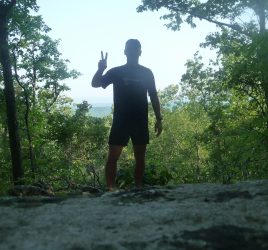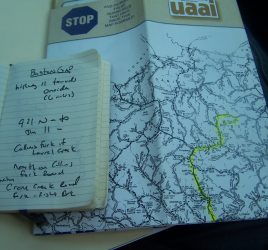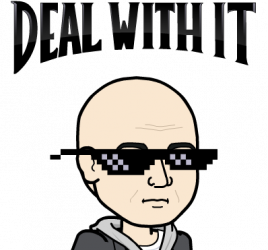“I carried a deep-seated shame that he didn’t know.”
“The Edge…There is no honest way to explain it because the only people who really know where it is are the ones who have gone over. The others- the living- are those who pushed their luck as far as they felt they could handle it, and then pulled back, or slowed down, or did whatever they had to when it came time to choose between Now and Later.” — Hunter S. Thompson in Hell’s Angels
When I pulled into the Poppy Trail Trailer Park in Beaumont, California in late 2010, I wasn’t sure what to expect.
For much of my life, there’s been a disconnect between the stories I tell, and the life behind those stories. Since I began this project, I’ve increasingly found it difficult to escape from that dichotomy. Worse yet, I chose to handle that dichotomy by constructing the most superficial of stories about my family and its history so that I might more easily pass into new, more sophisticated worlds.
Instead of creating a solid foundation with that history, I found I’d created a weak scaffolding that required more attention just to keep it from crumbling. The net result was a feeling of restlessness. In order to fill the void, I had to keep moving up the ladder, always assuming that the next rung would bring some sense of satisfaction.
I thought those feelings of aloneness were a symptom of the just natural order of life. After all, we are internal creatures, viewing the world around us through a lens that begins in our own brains. No matter where we are, the world we perceive is something that is not us. I’m not sure our brains have evolved in such a way that we ever truly feel comfortable within any setting.
That is how I justified my trepidation, which still exists today. As I’ve traveled around the United States meeting my relatives, I’ve had this deep-seated sense nibbling at my insides that once I entered one of their homes, I would suddenly — and obviously — find myself out of place.
It’s important to understand when I say out of place, I don’t mean more sophisticated. I mean just the opposite. While many of my immediate kin had largely come of age in rural areas before scattering across the county, I had run from that.
The problem hasn’t even been with them. It’s always been with me. Only as I pulled into the trailer park looking for my Great Uncle Robert Lee, one of the last son’s of Bobby Baker, whose murder brought an end to the Clay County War in 1936, did I begin to realize this?
Since the time I can first remember thinking about my life, I had always wanted to go to places that were bigger. In my mind, these shining cities were places of opportunity, and the small towns of my childhood meant slow, certain, and obscure death. This anxiety became more pronounced as I got older, and more than one girlfriend told me that she never seriously considered a long-term relationship with me because it was very clear that I would never take the time to settle down.
As I moved through the professional world, I soon found myself out of place for an entirely new reason.
I found myself completely out of place as I attended graduate school at Berkeley, worked at Conde Nast’s Wired, and the Massachusetts Institute of Technology. I’d spent a lifetime searching for the brass ring without concerning myself with the people who might be at that ceremony. Instead of slipping into a comfortable rapport with my contemporaries, I found myself feeling even smaller than I had when I lived in Appalachia.
Distraught, afraid, and inadequate, I fell back on the only identity I knew. I found myself telling stories about Appalachia and little snippets of what I knew about my heritage as a way to differentiate myself. Without the blue-blooded pedigree of many of the people I found myself surrounded by, I turned to the well-worn tale of the country-boy-done-good. I created an identity that was both the truth and a lie.
I was neither of Appalachia nor of the new world. For nearly 20 years, I found myself in that purgatory, a liar waiting to be exposed. That is the voice that has picked at me from the day I decided to search for my history, to claim my identity, and to connect with the people who made it possible for me to be here today.
It’s only now as I park my car, and walk over to introduce myself to Bob Baker, Robert Lee’s son, that it dawns on me that the problem has always been with me.
Bob, who is hanging is washed clothes on the line outside as a light rain falls, walks towards me. We’ve never met, but in the last few days we’ve talked on the phone a few times. There is no hesitation in his stride or his voice. He’s a hair shorter than me, just about 5-foot, 7-inches, with straight stringy hair that still holds its contour when he runs his hands through it. He ducks under the clothes, and extends his hand.
We are kin, and that is all that matters.
“How are you doing Brad?”
“Good Bob.”
We barely exchange pleasantries before we start sharing the details of our lives, a story that not as uncommon in our family as it may be in yours.
“Well, I just got over losing everything. All my money. My job. My wife. My house. I like to lead a civilized life, and after a year, this (trailer park) is starting to get to me.”
He is living in a small, white van with the front window broken out, covered with a cardboard box. He’s on the lot with Robert Lee, a fact that’s he’s non-plussed about.
As I look around, I can’t help be think back to just a few years before as I sat in my small apartment in Kentucky, wrenching on the floor, my body convulsing as I got sober. Days would pass without notice. It wasn’t uncommon for me to fall asleep in a living room chair several days in a row. There were days I would forget to eat unless my father or one of my friends brought me food.
I want to tell Bob how proud I am that he’s turning his life around, even if he can’t see it now. We are Bakers, and that is enough. Within moments of meeting him, the nibbling voice inside me faded away as it would every subsequent time I’d met a new member of my family. With each puzzle piece I fit into place, I would find a bit more of myself.
The difference between Bob and I was just a matter of degree. Our lives had taken on eerily similar trajectories. Yet an objective observer would have likely said my life was empirically better, and it would be hard to argue otherwise. The difference between my cousin and I was this: I carried a deep-seated shame that he didn’t know. I bought into the idea that my heritage was something less than it was, and I spent a lifetime letting people believe the same.
As I stood with my cousin, I realized there was an honor in our legacy even if there was dishonor in the story.
“My dad and I, we kinda fell out,” he says, his voice trailing off. “He cares more about his enemies than he could ever care about us. There’s no expense spared to get his enemies.”
<<to be continued>>



